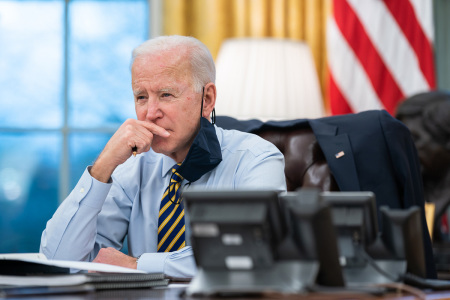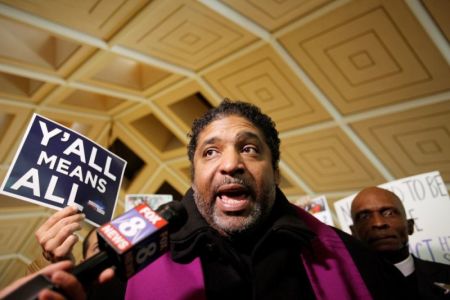Progressive Christian leaders call for abolishing Senate filibuster blocking Biden's agenda

A group of more than 20 progressive religious leaders has joined the Poor People’s Campaign in demanding a repeal of the U.S. Senate filibuster, claiming it subverts democracy by denying the will of the majority.
“The filibuster is a centerpiece of the arcane, obstructionist rules of the United States Senate. It bars that body from the deliberative role it is supposed to have,” Poor People’s Campaign Co-Chair Rev. William J. Barber II, the pastor of Greenleaf Christian Church (Disciples of Christ) in Goldsboro, North Carolina, said during a press conference last Thursday.
“The filibuster discourages public debate. It impedes the public’s capacity to find out whether or not their elected representatives are blocking legislation that would serve them and lift them up. The filibuster creates an impoverished democracy.”
The filibuster is a loosely defined term for action designed to prolong debate and delay or prevent a vote on a bill, resolution, amendment or other debatable question in the Senate. Before 1917, the Senate rules did not provide for a way to end debate and force a vote on a measure.
That year, the Senate adopted a rule to allow a two-thirds majority to end a filibuster through a procedure known as "cloture." In 1975, the Senate reduced the threshold for cloture from two-thirds to three-fifths (60 senators.)
The current division of seats in the Senate is 50 Republicans, 48 Democrats, and two Independents who caucus with the Democrats. Democrats hold the majority due to the tie-breaking vote of Vice President Kamala Harris.
However, this slim majority does not meet the 60-seat threshold required to advance much of President Joe Biden’s ambitious policy agenda, which has led to mounting calls to repeal the filibuster.

Responding to questions from The New York Times Editorial Board just over a year ago, Biden indicated that he did not support repealing the filibuster, expanding the Supreme Court, abolishing the Electoral College or setting term limits for Supreme Court justices.
The group of religious leaders who have joined in the Poor People’s Campaign’s call to end the filibuster includes Rev. Frederick Douglass Haynes III, senior pastor of Friendship West Baptist Church, Dallas, Texas; Rev. Reginald Buckley, senior pastor of Cade Chapel Baptist Church in Jackson, Mississippi; and Bishop Yvette Flunder, senior pastor of City of Refuge UCC in Oakland, California.
The group has also signed onto a “Pastoral Letter to the Nation” urging legislators not to allow the filibuster to “prevent passage of federal voting rights protections this year.”
“Many people have supported the filibuster as a procedural rule that promotes bi-partisanship by encouraging Senators to work across the aisle in pursuit of policies that benefit all Americans. While this may be a noble ideal, the sad reality is that the filibuster has been used over and again to subvert democracy by denying the will of the overwhelming majority of Americans who want to protect the promise of unfettered access to ballot for every American,” they argued. “The filibuster must step aside so that democracy can survive.”
During the press conference, all of the pastors remained united in their call.
“The filibuster and voter suppression bills across the country have been united in unholy wedlock and yet having the nerve to be dressed up in a tuxedo of political respectability,” Rev. Haynes argued.
“It’s morally reprehensible. It’s democratically unsustainable and we have a clear choice in this battle. Will we have a government by the few for the few, or will we have a government by the people and for the people?”
Rev. Liz Theoharis, the co-chair of the Poor People’s Campaign and director of the Kairos Center for Religions, Rights and Social Justice, noted that ending the filibuster is necessary to “save the soul of our democracy.”
“As a white Christian, as a pastor, and a biblical scholar, I’m motivated to speak out against using the filibuster in this country to filibuster democracy, to filibuster the expansion and protection of voting rights, to filibuster living wages, and healthcare, and housing, and adequate guaranteed incomes, and debt cancellation, and water, and sanitation, and housing rights, and so much more,” she said.
“We must end the filibuster. We must do this to save the soul of our democracy. We must do this to stand against racism, and poverty, and ecological devastation, and militarism, and this distorted, false moral narrative of Christian nationalism. And we must do it now.”
FLASHBACK -- Presidential candidate Joe Biden in 2020 was asked which of these ideas he supported: expanding the size of the Supreme Court, setting term limits for justices, abolishing the legislative filibuster.
— Rep. Brian Mast (@RepBrianMast) April 15, 2021
"None." - Biden responded.
Joe Biden should listen to Joe Biden. pic.twitter.com/9IJiQSU88Y
While some Democrats want to nix the filibuster rules so that it will be easier to advance a liberal agenda with control of both legislative chambers, others are wary of the idea.
Ronald Weich, dean of the University of the Baltimore School of Law who served as chief counsel to Sens. Edward M. Kennedy and Harry Reid and served as an assistant attorney general during the Obama administration, argues against repealing the filibuster.
“Progressives pushing to end the filibuster are suffering from a bad case of amnesia,” Kennedy wrote in an op-ed for Politico last Wednesday.
“The past three decades, in fact, are filled with moments when the filibuster prevented Republicans from pushing through legislation that would have made America a far darker place,” Weich continued. “The Democrats now in power should weigh the present opportunity against future peril. Republicans have their own ambitious agenda which they will be delighted to enact over the helpless cries of a filibuster-less Democratic minority as soon as they can.”
He argued that while the filibuster has been used to “block noble bills” in the past, leaving a political majority unchecked “can wreak havoc.”
“Proponents of filibuster abolition correctly point out that the filibuster has been sometimes deployed to block noble bills such as the mid-20th century civil rights legislation. But obstruction by the minority can eventually be overcome by popular will and presidential leadership, as eventually occurred with civil rights. In contrast, an unchecked majority can wreak havoc,” he argued.
“Without the filibuster, the Senate would become revenge-soaked, Hatfield and McCoy-style, as the two sides take turns passing laws over the futile objections of their adversaries. If Democrats expand voting rights, the next Republican majority will constrict voting rights. If Democrats expand the membership of the Supreme Court, Republicans will expand it further to add GOP appointees.”
Weich argues that the “filibuster is valuable in its own right, as a device to encourage bipartisanship and moderation, consistent with other checks and balances in our constitutional system.”
“But one need not admire the filibuster as a positive force to recognize how dangerous its absence would be,” the law school dean asserted. “There is a reason a unilateral rules change is known as ‘the nuclear option.’ Unless the doctrine of mutually assured destruction is respected, the Senate blows up.”





















